Conveyor Belt Rubber Suppliers And Manufacturers
In the realm of industrial operations, the role of high-quality conveyor belts is pivotal. These belts facilitate the smooth and efficient movement of goods across various stages of production and distribution. Opting for substandard belts can lead to frequent downtime, repairs, and even unsafe working conditions, thereby inflating operational costs and compromising workplace safety. Therefore, selecting the right conveyor belt rubber suppliers becomes a crucial decision for businesses aiming to enhance their production efficiency and safety standards. By choosing a reputable supplier, companies ensure that they receive belts that are not only durable and efficient but also tailored to meet the specific needs of their operations. This strategic choice significantly influences the overall productivity and cost-efficiency of industrial activities, making it an essential consideration for businesses looking to optimize their operational dynamics.
Conveyor Belt Rubber Suppliers
Conveyor belt rubber is a critical component in the manufacturing and handling sectors, provided by specialized conveyor belt rubber suppliers. This material is essential for creating conveyor belts used in various industrial and commercial applications. Below, we delve into the definition, characteristics, and the importance of high-quality rubber as supplied by these providers.
Definition and Key Characteristics
Conveyor belt rubber is a specially formulated elastomer that is produced to withstand the rigorous conditions of conveyor systems. This rubber can be made from natural rubber or synthetic materials such as polyurethane or PVC, depending on the application requirements. The key characteristics that conveyor belt rubber suppliers focus on include:
- Durability: The rubber is designed to resist wear and tear caused by the continuous movement of goods and materials.
- Elasticity: It maintains flexibility over a wide temperature range, which is crucial for maintaining performance and avoiding cracks or breaks under tension.
- Tensile Strength: High tensile strength is critical to withstand the forces applied by the conveyor system without elongating excessively.
- Abrasion Resistance: The rubber must resist abrasion from materials and the conveyor system itself, which helps in extending the belt’s operational life.
- Chemical Resistance: Depending on the industrial application, the rubber may need to resist chemicals, oils, and other substances that could degrade it.
Importance of Rubber Quality and Specification
The quality and specification of conveyor belt rubber are pivotal, influencing the efficiency and safety of the conveyor system. Here are ten reasons why the rubber’s quality and specifications provided by conveyor belt rubber suppliers are crucial:
- System Efficiency: High-quality rubber ensures that the conveyor belt operates smoothly, reducing downtime and maintenance needs.
- Cost-Effectiveness: Durable rubber materials minimize the need for frequent replacements, thereby lowering operational costs over time.
- Safety: Belts made from superior quality rubber are less likely to snap or cause industrial accidents, enhancing workplace safety.
- Customization: Conveyor belt rubber suppliers can customize the rubber compounds to better suit specific environmental conditions or operational needs.
- Load Handling: High-quality rubber can handle heavier loads without stretching or breaking, crucial for industrial applications such as mining and construction.
- Temperature Resistance: Good quality rubber maintains its integrity across various temperature ranges, which is essential for industries like food processing or those that operate in extreme climates.
- Speed Compatibility: The right rubber specification allows the belt to operate at higher speeds more reliably, essential for maximizing throughput.
- Noise Reduction: Quality rubber typically operates quieter, which is critical in environments where noise reduction is necessary.
- Vibration Dampening: Superior rubber absorbs and dampens vibrations caused by the operation of the conveyor, protecting the structure and prolonging its lifespan.
- Compliance and Standards: High standards of production ensure that the rubber meets international safety and quality standards, which is vital for global operations and compliance.
The role of conveyor belt rubber suppliers is to provide materials that meet these stringent requirements, ensuring their products perform well under the specific conditions of their customers’ applications. By understanding the properties and benefits of high-quality conveyor belt rubber, industries can make informed choices that optimize their operations and safety standards.
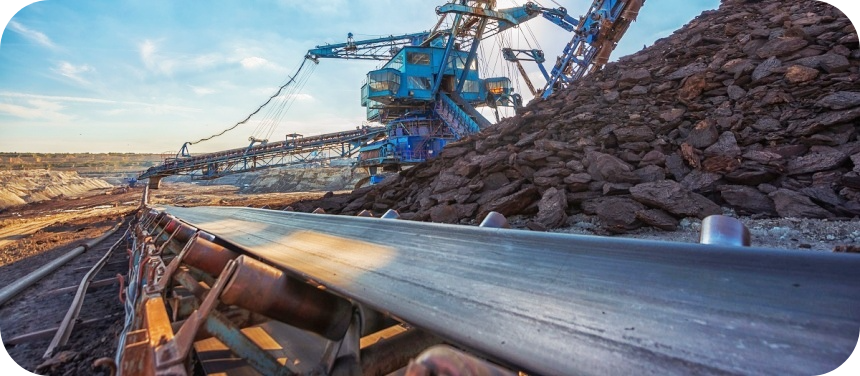
Conveyor Belt Rubber Manufacturers
Here are some of the leading conveyor belt rubber manufacturers known for their quality products and innovative solutions:
1. Fenner Dunlop
- Overview: A leading manufacturer of heavyweight conveyor belting and a global leader in conveyor systems.
- Specialties: Custom belt designs, rubber compound development, and advanced belt manufacturing processes.
- Industries Served: Mining, bulk material handling, and other heavy-duty applications.
2. ContiTech (Continental AG)
- Overview: Part of the Continental Corporation, ContiTech is a global leader in the manufacturing of conveyor belts.
- Specialties: High-quality rubber conveyor belts, innovative technology, and tailor-made solutions.
- Industries Served: Mining, agriculture, automotive, and industrial applications.
3. Goodyear Rubber Products, Inc.
- Overview: Known for their comprehensive range of rubber products, including conveyor belts.
- Specialties: Custom fabrication, on-site splicing, and maintenance services.
- Industries Served: Food processing, packaging, and heavy industry.
4. Sempertrans (Semperit Group)
- Overview: A well-established global player in the conveyor belt market with over 50 years of experience.
- Specialties: High-performance rubber conveyor belts, innovative design, and custom solutions.
- Industries Served: Mining, cement, steel, and port industries.
5. Bando Chemical Industries, Ltd.
- Overview: A Japanese manufacturer with a significant presence in the global conveyor belt market.
- Specialties: High-quality rubber conveyor belts and innovative belt design technology.
- Industries Served: Automotive, agriculture, and industrial applications.
6. Habasit
- Overview: A leading supplier of synthetic conveyor belts with a growing range of rubber-based belts.
- Specialties: Lightweight and heavy-duty conveyor belts, advanced fabric technology, and custom solutions.
- Industries Served: Food processing, logistics, textile, and printing industries.
7. Bridgestone Corporation
- Overview: Known for its high-quality tires, Bridgestone also manufactures durable and reliable conveyor belts.
- Specialties: Heavy-duty and high-performance rubber conveyor belts.
- Industries Served: Mining, bulk handling, and heavy industry.
8. Yokohama Rubber Co., Ltd.
- Overview: A Japanese multinational company producing a wide range of rubber products, including conveyor belts.
- Specialties: Advanced rubber compound technology, heavy-duty belts, and custom solutions.
- Industries Served: Mining, construction, and industrial applications.
9. Siban
- Overview: A Spanish company specializing in the manufacture of high-quality rubber conveyor belts.
- Specialties: Custom belt design, advanced manufacturing techniques, and robust product offerings.
- Industries Served: Mining, agriculture, and industrial sectors.
10. Dunlop Conveyor Belting
- Overview: A European manufacturer known for producing high-quality rubber conveyor belts.
- Specialties: Innovative belt designs, superior quality, and extensive industry experience.
- Industries Served: Mining, bulk handling, and heavy-duty industrial applications.
These manufacturers are recognized for their commitment to quality, innovation, and customer service, making them leaders in the conveyor belt rubber industry.
Types of Conveyor Belt Rubber
Conveyor belts are an essential part of various industrial processes, and they come in different types, each suited to specific applications. The types of conveyor belt rubber commonly used include:
Natural Rubber:
- Characteristics: High elasticity, good tensile strength, and excellent resistance to wear and tear.
- Applications: Used in applications requiring high flexibility and where the belt must endure heavy impacts.
Styrene-Butadiene Rubber (SBR):
- Characteristics: Good abrasion resistance, lower cost compared to natural rubber.
- Applications: General-purpose conveyor belts, ideal for moderate to heavy-duty applications.
Neoprene Rubber:
- Characteristics: Excellent resistance to oils, chemicals, and heat.
- Applications: Used in environments where the belt is exposed to oils, chemicals, or higher temperatures.
Nitrile Rubber (NBR):
- Characteristics: Superior resistance to oils and solvents.
- Applications: Suitable for conveying materials that contain oils or greases.
EPDM Rubber (Ethylene Propylene Diene Monomer):
- Characteristics: Excellent resistance to weather, ozone, and UV radiation.
- Applications: Outdoor applications where the belt will be exposed to the elements.
Butyl Rubber:
- Characteristics: Good chemical resistance and low permeability to gases.
- Applications: Used in applications where the belt must be impermeable to gases or where chemical exposure is a concern.
PVC (Polyvinyl Chloride) Rubber:
- Characteristics: Good resistance to abrasion and chemicals, relatively low cost.
- Applications: Common in food processing and packaging industries due to its hygienic properties.
Silicone Rubber:
- Characteristics: High-temperature resistance, excellent release properties, and food-grade applications.
- Applications: Used in the food industry and other applications requiring high-temperature resistance and non-stick properties.
Polyurethane (PU) Rubber:
- Characteristics: Extremely high resistance to abrasion, cuts, and wear.
- Applications: Ideal for applications involving heavy loads and high-speed conveyors.
Each type of conveyor belt rubber is designed to meet specific needs, balancing factors like durability, flexibility, resistance to various substances, and cost-effectiveness. Selecting the right type of rubber depends on the specific requirements of the application, such as the material being conveyed, environmental conditions, and mechanical demands.
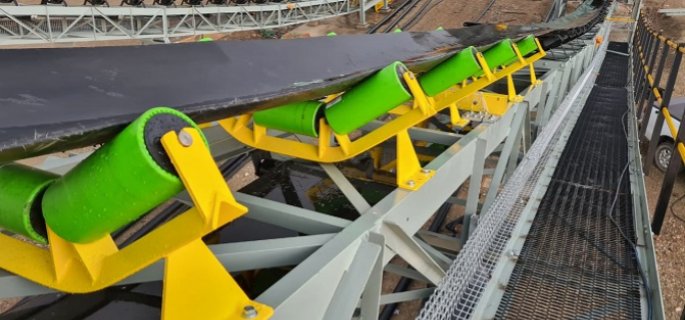
Types of Conveyor Belt Rubber Provided by Suppliers
The quality and type of rubber used in conveyor belts vary significantly, depending on their intended use. Conveyor belt rubber suppliers offer a range of rubber types to cater to different industrial needs. Understanding these variations is crucial for selecting the right type of conveyor belt rubber that meets specific operational requirements. Here’s a detailed look at the types of conveyor belt rubber available:
By choosing the appropriate type of conveyor belt rubber from reliable conveyor belt rubber suppliers, businesses can optimize the lifespan and efficiency of their conveyor systems, reduce maintenance costs, and enhance operational safety. Each type of rubber is designed to meet specific environmental and mechanical requirements, ensuring that there is a suitable option for virtually any industrial application.
Top Conveyor Belt Rubber Suppliers
Selecting the right conveyor belt rubber suppliers is crucial for ensuring optimal performance and longevity of conveyor systems. The market boasts several leading companies known for their quality and comprehensive range of conveyor belt rubbers suitable for various industrial needs. Here’s an overview of some of the top conveyor belt rubber suppliers:
MIR Belting
MIR Belting stands out among conveyor belt rubber suppliers for its wide array of products that cater to both general purpose and specialized needs. Their offerings include:
- Heavy Duty Belts: Designed to handle the toughest materials and conditions, ideal for mining, construction, and aggregates.
- Specialized Belts: These include belts specifically designed for high temperature environments, oil-resistant models, and fire-resistant belts that meet stringent safety standards.
MIR’s products are renowned for their durability and reliability, ensuring that operational efficiencies are maintained and downtime is minimized.
YOKOHAMA RUBBER Co., Ltd
YOKOHAMA RUBBER is globally recognized for producing high-performance conveyor belts. Key features of their products include:
- High Durability: Their belts are built to last, even under severe stress and in harsh environmental conditions.
- Innovative Design: YOKOHAMA RUBBER frequently incorporates new technologies and materials to improve the performance and lifespan of their conveyor belts.
These characteristics make YOKOHAMA RUBBER a preferred supplier for industries that require the highest levels of reliability and performance from their conveyor systems.
Other Notable Suppliers
The landscape of conveyor belt rubber suppliers is diverse, with several key players offering unique products:
- Suppliers in the USA: For businesses looking to source domestically, American suppliers offer competitive products that comply with rigorous US manufacturing standards. These suppliers are ideal for companies prioritizing local customer service and faster shipping times.
- Options for Heavy-Duty Applications: Some suppliers specialize in heavy-duty conveyor belts that are essential for industrial applications such as mining and metals processing. These belts are designed to carry heavy loads without compromise and to withstand the associated wear and tear.
- Suppliers of Used Conveyor Belt Rubber: For cost-effective solutions, some suppliers offer used conveyor belts. These belts are inspected and refurbished to ensure they provide reliable performance at a lower cost, suitable for businesses operating on tight budgets or those looking for environmentally friendly recycling options.
Choosing the right conveyor belt rubber supplier involves considering your specific needs, including the type of materials the belt will carry, the operational environment, the required durability, and your budget. The suppliers listed above provide a wide range of options that can meet nearly any requirement, helping to enhance efficiency and safety across various industries. Whether you need a belt for a high-temperature application or a durable solution for mining, these top suppliers have the products and expertise to support your business’s operational needs.
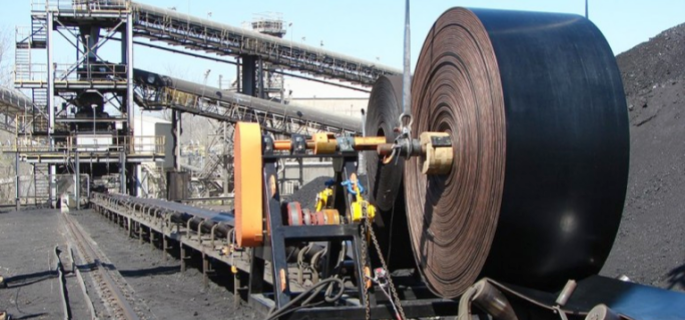
Choosing the Best Conveyor Belt Rubber Suppliers
When it comes to integrating new conveyor belts into your operations, selecting the right conveyor belt rubber suppliers is paramount. The best suppliers not only provide quality products but also support your operational goals through comprehensive services and support. Here are key factors to consider to ensure you choose the best supplier for your needs:
Product Range
A diverse product range is one of the most critical factors when selecting a conveyor belt rubber supplier. Suppliers with a broad array of products offer more flexibility, enabling you to choose the ideal belt for your specific requirements. Key aspects include:
- Variety of Materials: Whether you need polyurethane, PVC, or silicone conveyor belts, the supplier should have multiple options available.
- Belt Types: From general duty belts to those specialized for heat resistance, oil resistance, or fire safety, the ability to source all your needs from one supplier simplifies logistics and integration.
- Customization: The best suppliers can provide customized belt sizes and designs tailored to meet unique operational demands.
Quality Assurance
The quality of conveyor belts can significantly impact your process efficiency and maintenance costs. Therefore, assessing the quality assurance practices of conveyor belt rubber suppliers is essential:
- Certifications: Look for suppliers who have ISO certification or other industry-standard approvals that attest to their manufacturing and product quality.
- Testing Protocols: Reliable suppliers will have rigorous testing protocols for durability, strength, and longevity, ensuring that the belts perform well under typical operational stresses.
- Material Quality: The quality of the rubber and other materials used in the belt construction determines how well the belt will stand up to your specific environmental conditions.
Customer Service
After-sales support is crucial, as it can significantly affect the long-term value and effectiveness of your conveyor belts. Consider these elements when evaluating conveyor belt rubber suppliers:
- Technical Support: Good suppliers provide ongoing technical support, including installation guidance, troubleshooting, and maintenance tips.
- Availability: Suppliers should have a responsive customer service team that can promptly address your inquiries and concerns.
- Service Agreements: Look for suppliers that offer comprehensive service agreements, including regular maintenance and emergency service options, to help minimize downtime.
Price vs. Performance
Balancing cost with performance is critical in choosing a conveyor belt rubber supplier. While initial costs are an important consideration, focusing on total lifecycle costs can lead to better decision-making:
- Operational Efficiency: Evaluate how the belt’s performance will impact your overall operational efficiency. High-quality belts might cost more upfront but can lead to lower maintenance costs and less downtime.
- Longevity: Durable belts that can handle your specific applications will cost less over their lifespan compared to cheaper, less robust options that need frequent replacements.
- Cost-Benefit Analysis: Conduct a thorough cost-benefit analysis that includes not only purchase prices but also associated costs like installation, maintenance, and potential operational disruptions due to belt failures.
Choosing the right conveyor belt rubber suppliers involves a careful consideration of their product range, quality assurance standards, customer service capabilities, and the overall cost versus performance of their products. By thoroughly evaluating these factors, you can partner with a supplier that not only meets but exceeds your conveyor belt needs, enhancing both operational efficiency and profitability.
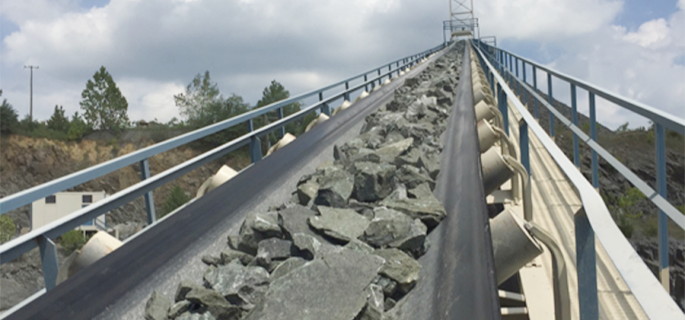
Conveyor Belt Rubber Suppliers Industries
Conveyor belt rubber suppliers serve a diverse range of industries, each with specific requirements and applications for conveyor systems. Here are the primary industries that rely on conveyor belt rubber suppliers:
1. Mining
- Applications: Transporting ores, minerals, coal, and other mined materials.
- Requirements: Heavy-duty, high-durability belts resistant to abrasion, impacts, and extreme conditions.
2. Agriculture
- Applications: Moving grains, seeds, fertilizers, and other agricultural products.
- Requirements: Belts that can handle large volumes, resist wear, and are easy to clean.
3. Food Processing
- Applications: Conveying food products through various stages of processing and packaging.
- Requirements: Food-grade, non-toxic, and hygienic belts that are easy to clean and comply with health regulations.
4. Automotive
- Applications: Assembly lines, parts transportation, and material handling within manufacturing plants.
- Requirements: Belts that offer precise movement, durability, and resistance to oils and chemicals.
5. Logistics and Warehousing
- Applications: Sorting, packing, and transporting goods within distribution centers and warehouses.
- Requirements: Belts with high efficiency, reliability, and the ability to handle a wide range of products.
6. Textile Industry
- Applications: Moving fabrics, threads, and other textile materials through various processing stages.
- Requirements: Belts that are gentle on materials, durable, and resistant to chemicals used in textile processing.
7. Construction
- Applications: Conveying building materials such as cement, sand, gravel, and bricks.
- Requirements: Heavy-duty belts capable of withstanding rough handling and harsh environments.
8. Packaging
- Applications: Moving packaged goods through different stages of the packaging process.
- Requirements: Belts that are flexible, reliable, and capable of handling various packaging types and sizes.
9. Cement and Concrete
- Applications: Transporting raw materials and finished products in cement and concrete production.
- Requirements: High-strength, abrasion-resistant belts that can handle heavy and abrasive materials.
10. Recycling and Waste Management
- Applications: Moving recyclable materials, waste products, and by-products through sorting and processing facilities.
- Requirements: Belts that are durable, resistant to wear, and capable of handling diverse and sometimes abrasive materials.
11. Pharmaceuticals
- Applications: Transporting pharmaceutical products through various stages of manufacturing and packaging.
- Requirements: Hygienic, non-toxic belts that comply with stringent health and safety regulations.
12. Energy Production
- Applications: Handling materials such as coal, biomass, and other fuels in power plants.
- Requirements: Heat-resistant, flame-retardant, and durable belts to ensure safe and efficient material handling.
Each industry has unique requirements for conveyor belts, influencing the choice of materials, design, and construction of the belts to ensure optimal performance and longevity in their specific applications.
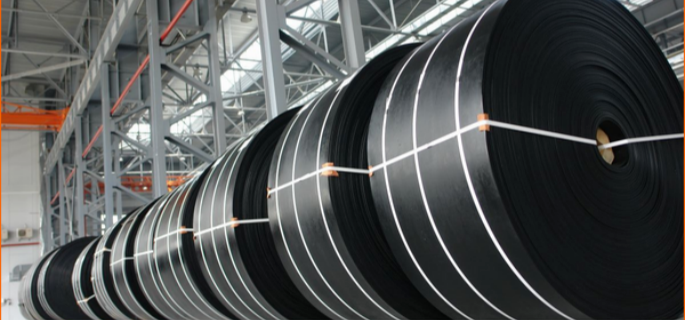
Additional Resources from Conveyor Belt Rubber Suppliers
When sourcing materials from conveyor belt rubber suppliers, additional resources can significantly impact the efficiency and cost-effectiveness of your operations. Whether you are looking for suppliers near you, considering the pros and cons of used versus new belts, or needing customized conveyor solutions, here are some detailed insights to guide you:
Inquire About Custom Conveyor Belt Rubber Solutions.
Near Me Options: Finding Local Conveyor Belt Rubber Suppliers
Locating conveyor belt rubber suppliers near your business can reduce shipping times and logistics costs. Here are ten tips to help you find a local supplier:
- Google Search: Use Google Maps or simply search for “conveyor belt rubber suppliers near me” to find local businesses.
- Industry Directories: Utilize online directories that list manufacturers and suppliers in specific industries.
- Trade Associations: Membership lists or affiliate details from industry-specific trade associations can be valuable.
- Trade Shows: Attend local and regional trade shows where suppliers showcase their products and services.
- Referrals: Ask for recommendations from industry contacts or business networks.
- Local Business Listings: Check local chamber of commerce directories or business listings.
- Social Media Groups: Join local industrial purchase groups or forums on platforms like LinkedIn and Facebook.
- Supplier Networks: Some suppliers might operate multiple branches. Check if a national supplier has a branch near you.
- Local Ads: Look for advertisements in industrial publications or local newspapers.
- Environmental Considerations: Choosing local suppliers can also reduce your company’s carbon footprint, aligning with sustainability goals.
Used vs. New Belts: Evaluating Conveyor Belt Rubber Suppliers’ Offerings
Buying used conveyor belts from conveyor belt rubber suppliers can be cost-effective, but there are pros and cons to consider:
Pros:
- Cost Savings: Used belts often cost significantly less than new ones, offering immediate financial benefits.
- Availability: They are usually available for immediate delivery, bypassing potential manufacturing wait times.
- Environmental Impact: Purchasing used belts reduces waste and supports recycling efforts.
- Tested Durability: Used belts have been operational and can still offer considerable functional life.
- Suitable for Non-Critical Applications: Perfect for applications where the belt conditions are not critical to the operation’s success.
- Flexibility: They can be a practical choice for temporary setups or non-standard applications where new belts would be excessively costly.
Cons:
- Wear and Tear: Used belts might come with unknown histories and potential weaknesses.
- Limited Life: They generally have a shorter remaining operational life than new belts.
- Fewer Choices: There may be limited options available in terms of sizes, types, and materials.
- Potential for Hidden Damage: Cracks, splits, and other damages might not be apparent at the time of purchase but can cause failures.
- No Warranties: Used belts typically come without the warranties that accompany new belts.
- Compliance Issues: They might not meet current industry standards or specifications required for certain applications.
Customization Options Available from Conveyor Belt Rubber Suppliers
Conveyor belt rubber suppliers often provide customization services that can significantly enhance the functionality of standard belts. Common customization options include:
- Custom Lacing: Suppliers can provide belts with specific lacing patterns that enhance grip and interface with machinery.
- Cleats: Integrated cleats help manage product movement, especially in incline and decline applications.
- Tracking Guides: These are essential for maintaining the belt’s path and can be customized to specific geometries and operational conditions.
- Hole Punching: Custom hole patterns can be added for mounting attachments or facilitating processes.
- Edge Sealing: This option can prevent fraying and extend the belt’s life, especially in rough applications.
- Cover Modifications: Modifying the cover material or texture can enhance the belt’s performance in specific environments.
Choosing the right conveyor belt rubber suppliers involves more than just finding someone who can provide a commodity. It requires selecting a partner who can offer valuable advice, comprehensive support, and tailored solutions that meet your specific needs. Whether optimizing logistics, weighing the benefits of used versus new products, or requiring customized features, these additional resources will help you make informed decisions and maintain effective operations.
FAQs about Conveyor Belt Rubber Suppliers
Conveyor belts are typically made from various types of rubber, each selected for its unique properties and suitability for different applications. The most common form of rubber used is Natural Rubber (NR), due to its excellent tensile strength, elongation, and abrasion resistance. Styrene-Butadiene Rubber (SBR) is another popular choice, especially for general-purpose belts, because it is affordable and resistant to abrasion. For more demanding conditions, such as extreme temperatures and exposure to oils or chemicals, Nitrile Rubber (NBR) or Ethylene Propylene Diene Monomer (EPDM) may be used. NBR is particularly valuable for its oil resistance, while EPDM offers superior heat, ozone, and weather resistance. In addition to these, Silicone Rubber can sometimes be found in conveyor belts used in food processing or high-temperature applications due to its heat resistance and non-toxic qualities.
The title of the largest manufacturer of conveyor belts often fluctuates based on current market trends and changes in production capabilities. However, as of the latest industrial data, companies like Continental AG often come out on top. With extensive products ranging from automotive parts to rubber technologies, Continental’s Conveyor Belt Group is one of the leading global suppliers of conveyor belts and complete conveyor systems. They offer a varied product portfolio that caters to a wide range of industrial applications worldwide. Continental AG has a global presence with production facilities and distribution networks in many countries, making it a powerhouse in the conveyor belt manufacturing industry. Please note that rankings can change, so for the most current information, it’s best to consult recent market analysis reports.
Industry conveyor belts are manufactured by a diverse array of companies across the globe, each specializing in different types of belts for various applications. Renowned manufacturers include Intralox, which specializes in modular plastic conveyor belts and Habasit, known for its broad selection of conveyor and processing belts. Other notable manufacturers encompass Fenner Group, which is prominent for heavy-duty conveyor belts used in mining and aggregates. There’s also MIR Belting, who provides customized conveyor belting solutions for multiple industries and is known for its design and fabrication capabilities. These companies have established themselves through consistent product reliability, technological advancements, and comprehensive services catering to the specific needs of the industries they serve.
Many companies are considered leaders in the conveyor belt sector due to their innovative products and comprehensive services. Bridgestone, Fenner Dunlop, Continental AG, and Techniks are often cited among the top companies. Bridgestone, a globally known tire manufacturer, has also developed robust conveyor belts that are highly regarded in the industry. Fenner Dunlop specializes in conveyor belting for mining and industrial applications. Continental AG leverages its global presence to offer a variety of conveyor belt types across different industries. Techniks provides a range of conveyor and transmission belting solutions, tailored to specific industry needs. The common denominator between these top companies is their commitment to quality, safety, and innovation, making them leaders in a competitive market. Each company’s history of performance and reliability cements their reputation and ensures trust among users in diverse industrial sectors.
Conveyor belts typically use various types of rubber depending on the application:
Natural Rubber: High elasticity and abrasion resistance, ideal for heavy impact applications.
Styrene-Butadiene Rubber (SBR): Cost-effective with good abrasion resistance, used for general purposes.
Neoprene Rubber: Resistant to oils, chemicals, and heat.
Nitrile Rubber (NBR): Excellent oil and solvent resistance.
EPDM Rubber: Weather, ozone, and UV resistant, suitable for outdoor use.
Polyurethane (PU): High abrasion and cut resistance, ideal for heavy loads.
Mixing: Blend raw rubber with additives.
Calendering: Form thin rubber sheets.
Fabric Reinforcement: Embed fabric layers for strength.
Lamination: Bond rubber and fabric layers with heat and pressure.
Curing/Vulcanization: Heat the belt to cross-link rubber molecules.
Cutting and Trimming: Cut to desired dimensions.
Inspection and Testing: Check for defects and ensure quality.
Packaging and Shipping: Prepare for delivery.
Last Updated on August 2, 2024 by Jordan Smith
Jordan Smith, a seasoned professional with over 20 years of experience in the conveyor system industry. Jordan’s expertise lies in providing comprehensive solutions for conveyor rollers, belts, and accessories, catering to a wide range of industrial needs. From initial design and configuration to installation and meticulous troubleshooting, Jordan is adept at handling all aspects of conveyor system management. Whether you’re looking to upgrade your production line with efficient conveyor belts, require custom conveyor rollers for specific operations, or need expert advice on selecting the right conveyor accessories for your facility, Jordan is your reliable consultant. For any inquiries or assistance with conveyor system optimization, Jordan is available to share his wealth of knowledge and experience. Feel free to reach out at any time for professional guidance on all matters related to conveyor rollers, belts, and accessories.



